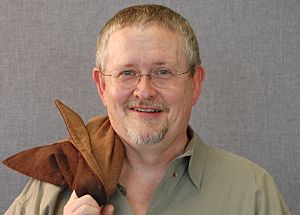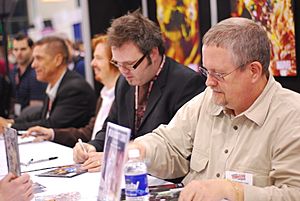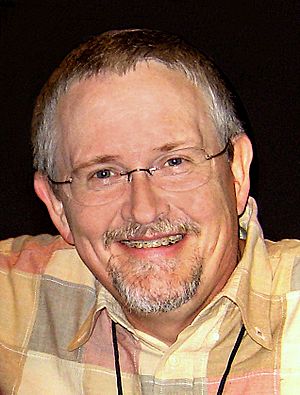Orson Scott Card facts for kids
Quick facts for kids
Orson Scott Card
|
|
|---|---|

Card at Life, the Universe, & Everything in 2008
|
|
| Born | August 24, 1951 Richland, Washington, U.S. |
| Pen name |
|
| Education | Brigham Young University (BA) University of Utah (MA) |
| Genre |
|
| Notable works | Ender's Game series, The Tales of Alvin Maker |
| Notable awards |
|
| Spouse | Kristine Allen |
| Children | 5 |
| Signature | |
 |
|
Orson Scott Card (born August 24, 1951) is a famous American writer. He is best known for his amazing science fiction stories. He is the only writer to have won both a Hugo Award and a Nebula Award in two years in a row. He won these awards for his novel Ender's Game (1985) and its follow-up, Speaker for the Dead (1986).
A movie based on Ender's Game was released in 2013, and Card helped make it. He also wrote The Tales of Alvin Maker series (1987–2003), which won the Locus Fantasy Award. Card's stories often feature characters with special talents who have to make tough choices. These choices usually have big consequences.
Card is a great-great-grandson of Brigham Young. He was born in Richland, Washington, and grew up in Utah and California. While he was a student at Brigham Young University (BYU), his plays were performed on stage. He also served as a missionary in Brazil for The Church of Jesus Christ of Latter-day Saints.
Card started publishing short stories in 1978. He won the John W. Campbell Award for best new writer that same year. He earned a master's degree in English from the University of Utah in 1981. Since 1979, he has written many novels in science fiction, fantasy, and historical fiction. He has published over 50 novels and 45 short stories.
Card teaches English at Southern Virginia University. He has written books about creative writing and helps judge the Writers of the Future contest. He has also taught many successful writers in his "literary boot camps."
Contents
Life Story
Growing Up and School

Orson Scott Card was born on August 24, 1951, in Richland, Washington. He is the third of six children. His family has a long history with Mormon pioneers.
When Card was a baby, his family moved to San Mateo, California. They later moved to Salt Lake City, Utah, and then to Santa Clara, California. In school, Card took classes for gifted students. He was very interested in music and played the clarinet and French horn. He also loved to read many different kinds of books.
At age ten, he wrote his first story. It was about a smart child who faced challenges. A part of his famous novel Ender's Game is based on this early story.
In 1964, Card's family moved to Mesa, Arizona. Later, in 1967, they moved to Orem, Utah. Card attended BYU's special school, where he took both high school and early college classes. He finished school in just one year. He first planned to study archeology, but he became more interested in theater. He started writing plays, many of which were about Mormon history.
Before graduating, Card served as a missionary for his church in Brazil, starting in 1971. He returned in 1973 and graduated from BYU in 1975 with a degree in theater. After college, he started a theater company. He later worked as a copy editor at BYU Press. In 1981, Card earned his master's degree in English from the University of Utah. He then decided to focus on writing full-time.
Family Life
In 1977, Orson Scott Card married Kristine Allen. They met when Kristine was in a show that Card directed. They have five children together. Sadly, their son Charles passed away at age 17, and their daughter Erin died the day she was born. Card has shared that his short story Lost Boys shows some of his feelings about these experiences.
Card and his wife live in Greensboro, North Carolina. Their daughter Emily has even adapted some of his short stories for the stage. In 2011, Card had a mild stroke but made a full recovery.
His Books and Stories
Early Writings
In 1976, Card became an editor for Ensign magazine. His first published story, Gert Fram, appeared in Ensign in 1977. Between 1978 and 1988, he wrote over 300 audio plays about church history and other topics.
Card started writing science fiction short stories because he thought they would be easier to sell. His first science fiction story, "Ender's Game", was published in Analog magazine in 1977. He left Ensign in 1977 to become a full-time writer. Many of his science fiction stories were published in 1978.
His story Mikal's Songbird was nominated for the Nebula and Hugo awards. Card won the John W. Campbell Award for best new writer in 1978. This award helped his stories become known around the world.
Card's first published book, "Listen, Mom and Dad...": Young Adults Look Back on Their Upbringing (1977), was about raising children. He also published his first two novels, Hot Sleep and A Planet Called Treason, in 1979. He later rewrote both of these books. His novel Songmaster (1980) was based on his story Mikal's Songbird.
In the early 1980s, Card focused on writing longer books. He also wrote some non-fiction books for a church audience. He wrote the fantasy book Hart's Hope (1983) and a historical novel, A Woman of Destiny (1984), which was later called Saints. In 1983, he got a contract for his proposed Alvin Maker series, which allowed him to write full-time again.
Late 1980s: Ender's Game and More
Card's 1977 short story "Ender's Game" was about a young boy training for space war. Card expanded this story into a full novel with the same title. He then wrote Speaker for the Dead, which tells more about Ender's adult life. Ender's Game and Speaker for the Dead both won the Hugo Award and the Nebula Award. This made Card the first author to win both top science fiction awards in two years in a row.
Card continued to write short stories and columns. He published two collections of his short stories: Cardography (1987) and The Folk of the Fringe (1989). His novella Eye for Eye won the Hugo Award for best novella in 1988. He also wrote books about how to write science fiction and fantasy.
Inspired by a classic poem, Card started The Tales of Alvin Maker series. The first book, Seventh Son (1987), is a fantasy story about a boy named Alvin Maker. Alvin is born with special magical abilities. The series explores themes like how people interact with nature and different cultures. Seventh Son won the Mythopoeic Fantasy award in 1988.
Card also wrote Wyrms (1987) and a novel based on the film The Abyss.
Books from the 1990s
Card wrote many books in the 1990s. He continued the Ender's Game series with Xenocide (1991) and Children of the Mind (1996). These books focus on Jane, an artificial intelligence that becomes self-aware.
He also started the Homecoming Saga, a science fiction series inspired by the Book of Mormon. The books in this series were published between 1992 and 1995. Alvin Journeyman (1995), the fourth book in The Tales of Alvin Maker series, won a Locus Award.
Card wrote several stand-alone novels in the 1990s. Pastwatch: The Redemption of Christopher Columbus (1996) explores time travel and Christopher Columbus. Lost Boys (1992) is a horror story with some personal background. Enchantment (1999) is a fantasy novel based on the story of Sleeping Beauty. Card said he put all his love for his wife into Enchantment.
Shadow Series and Later Works
In 1999, Card started a spin-off "shadow" series in the Ender's Game universe. These books tell stories from the perspective of other characters. They include Ender's Shadow, Shadow of the Hegemon, Shadow Puppets, Shadow of the Giant, and Shadows in Flight. The last book, The Last Shadow, connects to Children of the Mind.
Card also wrote other spin-off stories and novels like A War of Gifts and Ender in Exile. He worked with Aaron Johnston on prequel novels to Ender's Game, including Earth Unaware, Earth Afire, and Earth Awakens.
In the 2000s, Card wrote a series of books about women in the Bible, including Sarah (2000) and Rebekah (2002). He also wrote children's stories and a retelling of Shakespeare's Hamlet. The Crystal City (2003) is the sixth book in The Alvin Maker series.
Card wrote two young-adult fantasy series in the 2010s. The Mithermages series is about a teenager with magic powers. The Pathfinder series follows a young man who can change the past. He also wrote urban fantasies about teenagers with special powers.
Card wrote the Christmas novel Zanna's Gift (2004). He also co-wrote a medical thriller called Invasive Procedures (2007) with Aaron Johnston.
Video Games, Comics, and TV
In the 1990s, Card helped write dialogue for video games like The Secret of Monkey Island and The Dig. He continued working on video game stories in the 2000s, including Advent Rising.
Card has written scripts for comic books, including Ultimate Iron Man. He also worked with his daughters on the graphic novel Laddertop. In 2017, Card helped create a television series called Extinct for BYU TV.
Book and Story Adaptations
Many of Card's works have been turned into comic books. Red Prophet and Wyrms were adapted into comics in 2006. Marvel Comics published comic book versions of Ender's Game and Ender's Shadow.
For a long time, Card was careful about selling the film rights for Ender's Game. He wanted to make sure the movie would be true to his vision. In 2009, he announced that a script for the movie was being made. The film was released in 2013, and Card was a co-producer. Critics said that while the movie might not be as deep as the book, it offered exciting science fiction thrills.
Newspaper Articles
Since 2001, Card has written columns like "Uncle Orson Reviews Everything." These columns feature his personal reviews of films and thoughts on other topics. They are published on his website, "Hatrack River."
Writing Style and Themes
What Influenced Him
When Card was a child, he read many books, including classics and popular novels. He especially liked The Prince and the Pauper by Mark Twain. He also read many science fiction stories. Card often mentions works by Robert A. Heinlein and J. R. R. Tolkien as inspirations. He also credits C. S. Lewis's books, like The Chronicles of Narnia, for shaping his life.
Card has said that Isaac Asimov and Ray Bradbury influenced his writing. His membership in The Church of Jesus Christ of Latter-day Saints has also been a big influence on his stories. While his science fiction books don't directly mention his religion, they often explore deep moral ideas.
How He Writes
Because Card started writing screenplays, his early books are easy to read and move quickly. His science fiction focuses more on his characters and their feelings than on technical details of future technology. Card's stories often feature characters who are unique and face difficult situations.
Card uses a writing style where he sometimes starts sentences with words like "and" or "but." This comes from the Book of Mormon, which he has studied closely.
Main Ideas in His Works
Child Heroes
A common theme in Card's books is a very smart child who is different from others. This child is often alone but is in a special position to help or save their community. These characters have amazing abilities and achieve their goals through hard work and challenges. They are often thoughtful and relate better to adults than to other young people. As they grow up, they often guide other talented young people.
Card's characters often make sacrifices for their community. These sacrifices are tough choices where there isn't an easy answer. His stories show how groups can have problems when people aren't fully accepted or when communities don't work together. Often, different groups are in conflict, but they find peace when they try to understand each other.
For example, in Ender's Game, Ender Wiggin is a young boy with incredible talents. He is trained for war and has to make very difficult decisions that affect everyone. His story explores ideas about war, understanding others, and the ethics of manipulating children.
American Society
Card has written novels that explore ideas about American society. For example, Empire (2006) is a novel about a fictional civil conflict in America. This book was nominated for the Prometheus Award, which is given to science fiction books that explore freedom.
Awards and Recognition
In 1992, Card won the Edward E. Smith Memorial Award. In 2008, he won the ALA Margaret Edwards Award. This award recognizes writers who have made important and lasting contributions to young adult literature. Card also won the Lifetime Achievement Award for Mormon writers in 2008.
The Harold B. Lee Library has collected many of Orson Scott Card's papers, including his works, notes, and letters. Many famous writers, like Stephenie Meyer and Brandon Sanderson, have said that Card's books influenced them.
Card has also won many awards for individual works:
- 1978 John W. Campbell Award for Best New Writer for the Ender's Game novelette
- 1984 Saints: Book of the Year by the Association for Mormon Letters
- 1985 Ender's Game: Nebula Award, 1985; Hugo Award, 1986
- 1986 Speaker for the Dead: Nebula Award, 1986; Hugo Award, 1987; Locus Award, 1987
- 1987 "Eye for Eye": Hugo Award, 1988
- 1988 Seventh Son: Mythopoeic Society Award 1988; Locus Award winner, 1988
- 1989 Red Prophet: Locus winner, 1989
- 1991 How to Write Science Fiction and Fantasy: Hugo Award
- 1995 Alvin Journeyman: Locus Award winner, 1996
- 2002 Shadow of the Hegemon: ALA Best Books for Young Adults
Other Activities
Since 1994, Card has been a judge for Writers of the Future. This is a contest for new science fiction and fantasy writers. In 2005, Card started Orson Scott Card's InterGalactic Medicine Show, an online magazine for fantasy and science fiction.
In 2005, Card became a "distinguished professor" at Southern Virginia University. He has also taught courses on novel writing and held "literary boot camps" to help aspiring writers. Many successful authors have attended his workshops. Card has been a special guest at the Life, the Universe, & Everything symposium many times.
See also
 In Spanish: Orson Scott Card para niños
In Spanish: Orson Scott Card para niños
- Orson Scott Card bibliography
- LDS fiction
- Descendants of Brigham Young
 | Delilah Pierce |
 | Gordon Parks |
 | Augusta Savage |
 | Charles Ethan Porter |


